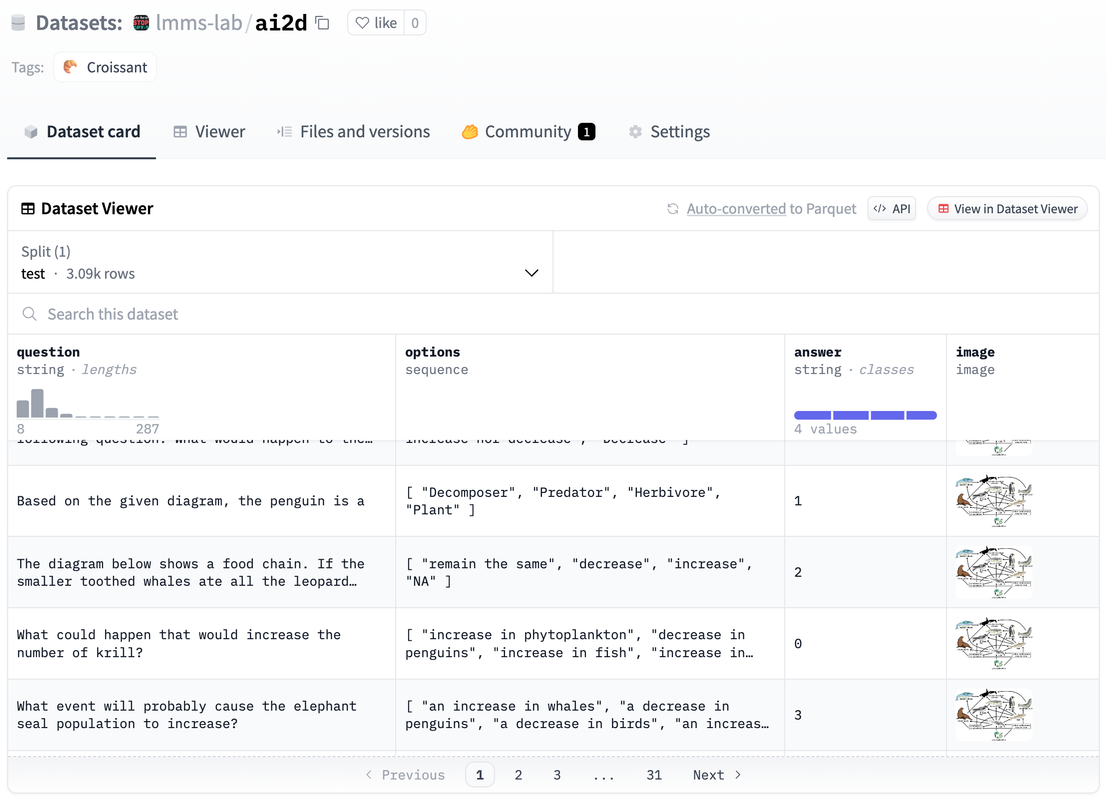Accelerating the development of large multimodal models (LMMs) with
lmms-eval
🏠 Homepage | 🎉 Blog | 📚 Documentation | 🤗 Huggingface Datasets | 
In today's world, we're on a thrilling quest for Artificial General Intelligence (AGI), driven by a passion that reminds us of the excitement surrounding the 1960s moon landing. At the heart of this adventure are the incredible large language models (LLMs) and large multimodal models (LMMs). These models are like brilliant minds that can understand, learn, and interact with a vast array of human tasks, marking a significant leap toward our goal.
To truly understand how capable these models are, we've started to create and use a wide variety of evaluation benchmarks. These benchmarks help us map out a detailed chart of abilities, showing us how close we are to achieving true AGI. However, this journey is not without its challenges. The sheer number of benchmarks and datasets we need to look at is overwhelming. They're all over the place - tucked away in someone's Google Drive, scattered across Dropbox, and hidden in the corners of various school and research lab websites. It's like embarking on a treasure hunt where the maps are spread far and wide.
In the field of language models, there has been a valuable precedent set by the work of lm-evaluation-harness. They offer integrated data and model interfaces, enabling rapid evaluation of language models and serving as the backend support framework for the open-llm-leaderboard, and has gradually become the underlying ecosystem of the era of foundation models.
However, though there are many new evaluation datasets are recently proposed, the efficient evaluation pipeline of LMM is still in its infancy, and there is no unified evaluation framework that can be used to evaluate LMM across a wide range of datasets. To address this challenge, we introduce lmms-eval, an evaluation framework meticulously crafted for consistent and efficient evaluation of LMM.
We humbly obsorbed the exquisite and efficient design of lm-evaluation-harness. Building upon its foundation, we implemented our lmms-eval framework with performance optimizations specifically for LMMs.
We believe our effort could provide an efficient interface for the detailed comparison of publicly available models to discern their strengths and weaknesses. It's also useful for research institutions and production-oriented companies to accelerate the development of large multimodal models. With the lmms-eval, we have significantly accelerated the lifecycle of model iteration. Inside the LLaVA team, the utilization of lmms-eval largely improves the efficiency of the model development cycle, as we are able to evaluate weekly trained hundreds of checkpoints on 20-30 datasets, identifying the strengths and weaknesses, and then make targeted improvements.
We've added guidance on contributing new datasets and models. Please refer to our documentation. If you need assistance, you can contact us via discord/lmms-eval.
The first version of the lmms-eval is released. We are working on providing an one-command evaluation suite for accelerating the development of LMMs.
In LLaVA Next development, we internally utilize this suite to evaluate the multiple different model versions on various datasets. It significantly accelerates the model development cycle for it's easy integration and fast evaluation speed.
The main feature includes:
You can evaluate the models on multiple datasets with a single command. No model/data preparation is needed, just one command line, few minutes, and get the results. Not just a result number, but also the detailed logs and samples, including the model args, input question, model response, and ground truth answer.
# Evaluating LLaVA on multiple datasets
accelerate launch --num_processes=8 -m lmms_eval --model llava --model_args pretrained="liuhaotian/llava-v1.5-7b" --tasks mme,mmbench_en --batch_size 1 --log_samples --log_samples_suffix llava_v1.5_mme_mmbenchen --output_path ./logs/ #We support the usage of accelerate to wrap the model for distributed evaluation, supporting multi-gpu and tensor parallelism. With Task Grouping, all instances from all tasks are grouped and evaluated in parallel, which significantly improves the throughput of the evaluation. After evaluation, all instances are sent to postprocessing module for metric calcuations and potential GPT4-eval queries.
Below are the total runtime on different datasets using 4 x A100 40G.
| Dataset (#num) | LLaVA-v1.5-7b | LLaVA-v1.5-13b |
|---|---|---|
| mme (2374) | 2 mins 43 seconds | 3 mins 27 seconds |
| gqa (12578) | 10 mins 43 seconds | 14 mins 23 seconds |
| scienceqa_img (2017) | 1 mins 58 seconds | 2 mins 52 seconds |
| ai2d (3088) | 3 mins 17 seconds | 4 mins 12 seconds |
| coco2017_cap_val (5000) | 14 mins 13 seconds | 19 mins 58 seconds |
We are hosting more than 40 (and increasing) datasets on huggingface/lmms-lab, we carefully converted these datasets from original sources and included all variants, versions and splits. Now they can be directly accessed without any burden of data preprocessing. They also serve for the purpose of visualizing the data and grasping the sense of evaluation tasks distribution.
We provide detailed logging utilities to help you understand the evaluation process and results. The logs include the model args, generation parameters, input question, model response, and ground truth answer. You can also record every details and visualize them inside runs on Weights & Biases.
{% include figure.liquid loading="eager" path="assets/img/wandb_table.png" class="img-fluid rounded z-depth-1" zoomable=true %}
For formal usage, you can install the package from PyPI by running the following command:
pip install lmms-evalFor development, you can install the package by cloning the repository and running the following command:
git clone https://github.com/EvolvingLMMs-Lab/lmms-eval
cd lmms-eval
pip install -e .If you wanted to test llava, you will have to clone their repo from LLaVA and
git clone https://github.com/haotian-liu/LLaVA
cd LLaVA
pip install -e .
You can check the environment install script and torch environment info to reproduce LLaVA-1.5's paper results. We found torch/cuda versions difference would cause small variations in the results, we provide the results check with different environments.
If you want to test on caption dataset such as coco, refcoco, and nocaps, you will need to have java==1.8.0 to let pycocoeval api to work. If you don't have it, you can install by using conda
conda install openjdk=8
you can then check your java version by java -version
# Evaluating LLaVA on MME
accelerate launch --num_processes=8 -m lmms_eval --model llava --model_args pretrained="liuhaotian/llava-v1.5-7b" --tasks mme --batch_size 1 --log_samples --log_samples_suffix llava_v1.5_mme --output_path ./logs/
# Evaluating LLaVA on multiple datasets
accelerate launch --num_processes=8 -m lmms_eval --model llava --model_args pretrained="liuhaotian/llava-v1.5-7b" --tasks mme,mmbench_en --batch_size 1 --log_samples --log_samples_suffix llava_v1.5_mme_mmbenchen --output_path ./logs/ #
# For other variants llava. Note that `conv_template` is an arg of the init function of llava in `lmms_eval/models/llava.py`
accelerate launch --num_processes=8 -m lmms_eval --model llava --model_args pretrained="liuhaotian/llava-v1.6-mistral-7b,conv_template=mistral_instruct" --tasks mme,mmbench_en --batch_size 1 --log_samples --log_samples_suffix llava_v1.5_mme_mmbenchen --output_path ./logs/ #
accelerate launch --num_processes=8 -m lmms_eval --model llava --model_args pretrained="liuhaotian/llava-v1.6-34b,conv_template=mistral_direct" --tasks mme,mmbench_en --batch_size 1 --log_samples --log_samples_suffix llava_v1.5_mme_mmbenchen --output_path ./logs/ #
# From a predefined configuration, supporting evaluation of multiple models and datasets
accelerate launch --num_processes=8 -m lmms_eval --config example_eval.yaml As demonstrated by the extensive table below, we aim to provide detailed information for readers to understand the datasets included in lmms-eval and some specific details about these datasets (we remain grateful for any corrections readers may have during our evaluation process).
We provide a Google Sheet for the detailed results of the LLaVA series models on different datasets. You can access the sheet here. It's a live sheet, and we are updating it with new results.
We also provide the raw data exported from Weights & Biases for the detailed results of the LLaVA series models on different datasets. You can access the raw data here.
Development will be continuing on the main branch, and we encourage you to give us feedback on what features are desired and how to improve the library further, or ask questions, either in issues or PRs on GitHub.
- GPT4V (API, only generation-based evaluation)
- LLaVA-v1.5/v1.6-7B/13B/34B (ppl-based, generation-based)
- Qwen-VL series (ppl-based, generation-based)
- Fuyu series (ppl-based, generation-based)
- InstructBLIP series (generation-based)
() indicates the task name in the lmms_eval. The task name is also used to specify the dataset in the configuration file.
- AI2D (ai2d)
- ChartQA (chartqa)
- CMMMU (cmmmu)
- CMMMU Validation (cmmmu_val)
- CMMMU Test (cmmmu_test)
- COCO Caption (coco_cap)
- COCO 2014 Caption (coco2014_cap)
- COCO 2014 Caption Validation (coco2014_cap_val)
- COCO 2014 Caption Test (coco2014_cap_test)
- COCO 2017 Caption (coco2017_cap)
- COCO 2017 Caption MiniVal (coco2017_cap_val)
- COCO 2017 Caption MiniTest (coco2017_cap_test)
- COCO 2014 Caption (coco2014_cap)
- DOCVQA (docvqa)
- DOCVQA Validation (docvqa_val)
- DOCVQA Test (docvqa_test)
- Ferret (ferret)
- Flickr30K (flickr30k)
- Ferret Test (ferret_test)
- GQA (gqa)
- HallusionBenchmark (hallusion_bench_image)
- Infographic VQA (info_vqa)
- Infographic VQA Validation (info_vqa_val)
- Infographic VQA Test (info_vqa_test)
- LLaVA-Bench (llava_in_the_wild)
- LLaVA-Bench-COCO (llava_bench_coco)
- MathVista (mathvista)
- MathVista Validation (mathvista_testmini)
- MathVista Test (mathvista_test)
- MMBench (mmbench)
- MMBench English (mmbench_en)
- MMBench English Dev (mmbench_en_dev)
- MMBench English Test (mmbench_en_test)
- MMBench Chinese (mmbench_cn)
- MMBench Chinese Dev (mmbench_cn_dev)
- MMBench Chinese Test (mmbench_cn_test)
- MMBench English (mmbench_en)
- MME (mme)
- MMMU (mmmu)
- MMMU Validation (mmmu_val)
- MMMU Test (mmmu_test)
- MMVet (mmvet)
- Multi-DocVQA (multidocvqa)
- Multi-DocVQA Validation (multidocvqa_val)
- Multi-DocVQA Test (multidocvqa_test)
- NoCaps (nocaps)
- NoCaps Validation (nocaps_val)
- NoCaps Test (nocaps_test)
- OKVQA (ok_vqa)
- OKVQA Validation 2014 (ok_vqa_val2014)
- POPE (pope)
- RefCOCO (refcoco)
- refcoco_seg_test
- refcoco_seg_val
- refcoco_seg_testA
- refcoco_seg_testB
- refcoco_bbox_test
- refcoco_bbox_val
- refcoco_bbox_testA
- refcoco_bbox_testB
- RefCOCO+ (refcoco+)
- refcoco+_seg
- refcoco+_seg_val
- refcoco+_seg_testA
- refcoco+_seg_testB
- refcoco+_bbox
- refcoco+_bbox_val
- refcoco+_bbox_testA
- refcoco+_bbox_testB
- refcoco+_seg
- RefCOCOg (refcocog)
- refcocog_seg_test
- refcocog_seg_val
- refcocog_bbox_test
- refcocog_bbox_val
- ScienceQA (scienceqa_full)
- ScienceQA Full (scienceqa)
- ScienceQA IMG (scienceqa_img)
- SeedBench (seedbench)
- SeedBench 2 (seedbench_2)
- ST-VQA (stvqa)
- TextCaps (textcaps)
- TextCaps Validation (textcaps_val)
- TextCaps Test (textcaps_test)
- TextVQA (textvqa)
- TextVQA Validation (textvqa_val)
- TextVQA Test (textvqa_test)
- VizWizVQA (vizwiz_vqa)
- VizWizVQA Validation (vizwiz_vqa_val)
- VizWizVQA Test (vizwiz_vqa_test)
- VQAv2 (vqav2)
- VQAv2 Validation (vqav2_val)
- VQAv2 Test (vqav2_test)
- TallyQA (tallyqa)
- VSR (vsr)
- Winoground (winoground)
- NLVR2 (nlvr2)
- RavenIQ-Test (raveniq)
- IconQA (iconqa)
- VistBench (vistbench)
Please refer to our documentation.
lmms_eval is a fork of lm-eval-harness. We recommend you to read through the docs of lm-eval-harness for relevant information.
Below are the changes we made to the original API:
- Build context now only pass in idx and process image and doc during the model responding phase. This is due to the fact that dataset now contains lots of images and we can't store them in the doc like the original lm-eval-harness other wise the cpu memory would explode.
- Instance.args (lmms_eval/api/instance.py) now contains a list of images to be inputted to lmms.
- lm-eval-harness supports all HF language models as single model class. Currently this is not possible of lmms because the input/output format of lmms in HF are not yet unified. Thererfore, we have to create a new class for each lmms model. This is not ideal and we will try to unify them in the future.
We also thank:
- Xiang Yue, Jingkang Yang, Dong Guo and Sheng Shen for early discussion and testing.
@misc{lmms_eval2024,
title={LMMs-Eval: Accelerating the Development of Large Multimoal Models},
url={https://github.com/EvolvingLMMs-Lab/lmms-eval},
author={Bo Li*, Peiyuan Zhang*, Kaichen Zhang*, Fanyi Pu*, Xinrun Du, Yuhao Dong, Haotian Liu, Yuanhan Zhang, Ge Zhang, Chunyuan Li and Ziwei Liu},
publisher = {Zenodo},
version = {v0.1.0},
month={March},
year={2024}
}



